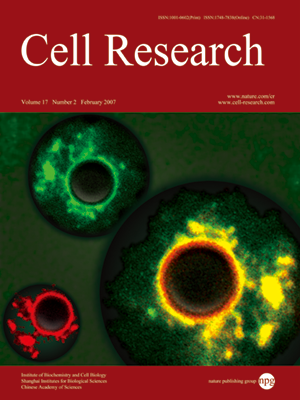Volume 17 Issue 2, February 2007: 151-162
ORIGINAL ARTICLES
Anti-apoptotic effect of retinoic acid on retinal progenitor cells mediated by a protein kinase A-dependent mechanism
Roman Kholodenko1, Irina Kholodenko1, Viktor Sorokin2, Anna Tolmazova1, Olga Sazonova1, Anton Buzdin1
1Shemyakin-Ovchinnikov Institute of Bioorganic Chemistry, 16/10 Miklukho-Maklaya, Moscow 117997, Russia; 2Russian State Medical
University, Ostrovityanova 1, Moscow 117312, Russia
Correspondence: Anton Buzdin(anton@humgen.siobc.ras.ru)
Retinal progenitor cells (RPCs) are neural stem cells able to differentiate into any normal adult retinal cell type,
except for pigment epithelial cells. Retinoic acid (RA) is a powerful growth/differentiation factor that generally
causes growth inhibition, differentiation and/or apoptosis. In this study, we demonstrate that RA not only affects
mouse RPC differentiation but also improves cell survival by reducing spontaneous apoptotic rate without affecting
RPC proliferation. The enhanced cell survival was accompanied by a significant upregulation of the expression of
protein kinase A (PKA) and several protein kinase C (PKC) isoforms. Treatment of cells grown in RA-free media
with 8-bromoadenosine3',5'-cyclic monophosphate, a known activator of PKA, resulted in an anti-apoptotic effect
similar to that caused by RA; whereas the PKA inhibitor N-[2-(p-bromocinnamylamino)ethyl]-5-isoquinolinesulfonamide
dihydrochloride led to a significant (~32%) increase in apoptosis. In contrast, treatment of RPCs with
any of two PKC selective inhibitors, 2,2',3,3',4,4'-hexahydroxy-1,1'-biphenyl-6,6'-dimethanol dimethyl ether and
bisindolylmaleimide XI, led to diminished apoptosis; while a PKC activator, phorbol 12-myristate 13-acetate, increased
apoptosis. These and other data suggest that the effect of RA on RPC survival is mostly due to the increased
anti-apoptotic activity elicited by PKA, which might in turn be antagonized by PKC. Such a mechanism is a new
example of tight regulation of important biological processes triggered by RA. Although the detailed mechanisms
remain to be elucidated, we provide evidence that the pro-survival effect of RA on RPCs is not mediated by changed
expression of p53 or bcl-2, and appears to be independent of β-amyloid, Fas ligand, TNF-α, ganglioside GM1 and
ceramide C16-induced apoptotic pathways.
Cell Research (2007) 17:151-162. doi: 10.1038/sj.cr.7310147; published online 13 February 2007
FULL TEXT | PDF
Browse 1883


